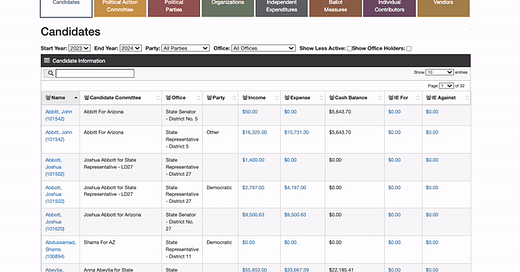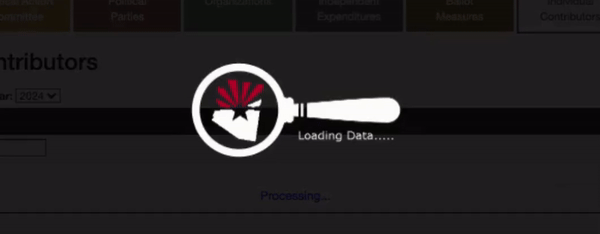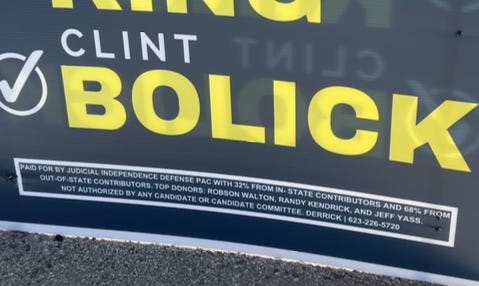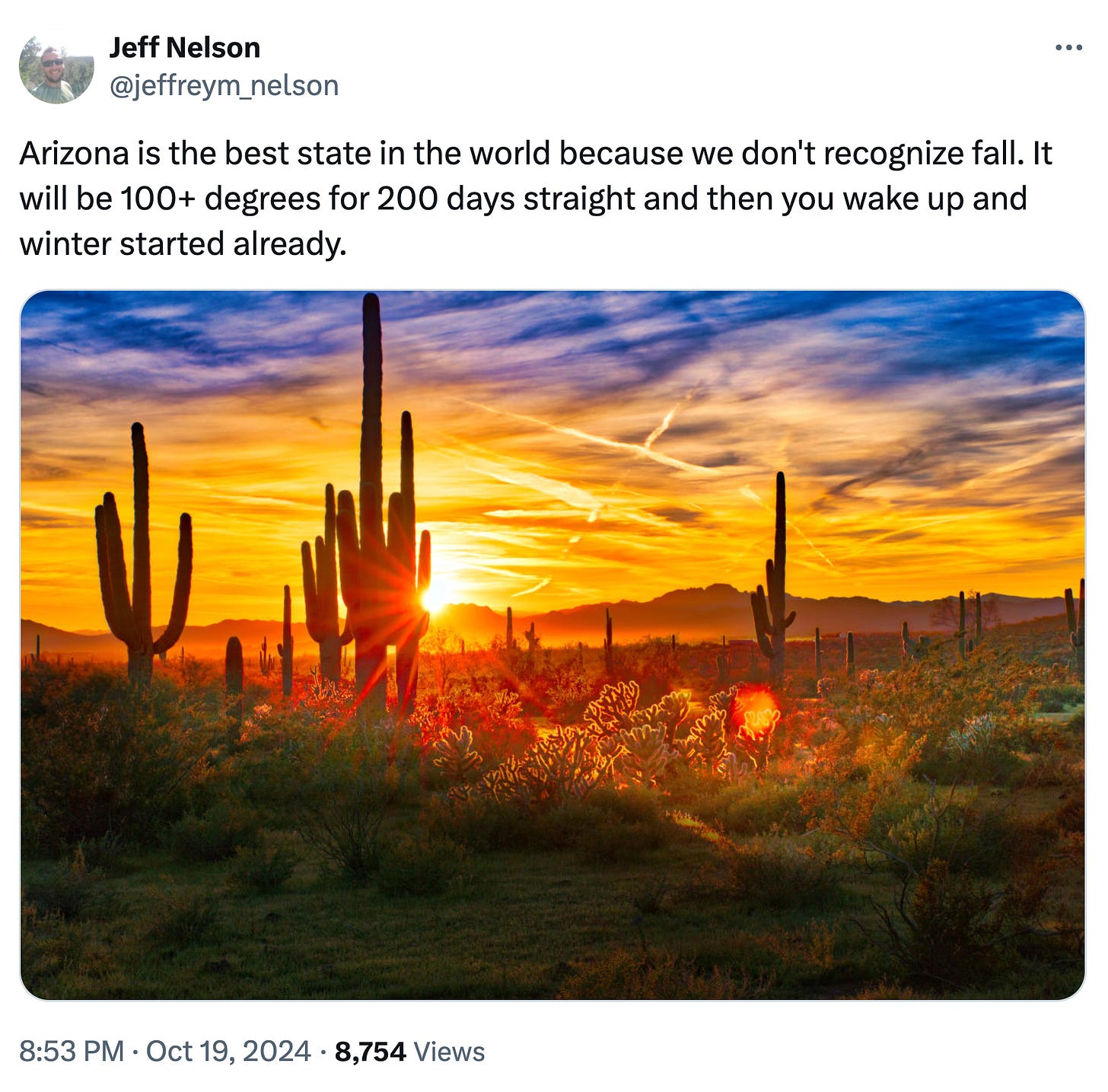The dark money nesting doll
The Voters' Right to Know, sometimes … Stealing elections is cheap … And is that Hunter?
In Arizona’s bitterly divided political environment, voters agree on at least one thing: We should know who is pouring money into our elections.
In 2022, more than 70% of Arizona’s voters approved Proposition 211, or the Voters’ Right to Know Act, requiring political committees spending more than $50,000 on a statewide campaign to disclose the source of individual contributions above $5,000.
The 2024 election cycle is the first time the law is in full effect, despite three separate lawsuits attempting to nullify it in court.
The idea is to get rid of the nesting doll of “dark money” campaign donations. Dark money lets donors influence elections without revealing who they are, and instead hide behind nonprofits or PACs with vague names that aren’t traceable back to them.
Unfortunately, despite the new law, it still takes an in-depth understanding of the state’s campaign finance reporting system to actually get to the root of the money — if that information is even available.
On the bright side, one tangible benefit voters have seen this year is a required disclaimer of big-money campaign ads’ top three donors.
That’s how we know this political sign advocating for the retention of Arizona Supreme Court Justices Clint Bolick and Kathryn King was paid for by the Judicial Independence Defense PAC. But instead of wondering who that ambiguous group is, we know its top three donors:
Robson Walton, the billionaire heir to the Walmart fortune.
Randy Kendrick, wife of Arizona Diamondbacks owner Ken Kendrick and conservative political activist recruiting Republican donors to back Prop 137, a ballot measure that would end retention elections and term limits for judges.
Jeff Yass, a billionaire who is big on free-market school systems and doled out $1 million with his wife to boost Arizona’s Empowerment Scholarship Accounts.
But if you don’t have time to strain your eyes while whizzing past a roadside sign, finding the big donors behind campaign spending still isn’t intuitive.
The Secretary of State’s Office hosts reports of contributions that fall under the dark money law in a single place on its election funds portal. You just have to know how to find it.1
But the reports outlining financial specifics for the donors that meet Prop 211 criteria don’t simply list a bunch of millionaire donors. It’s never that simple.
The VRKA (Voters’ Right to Know Act) reports are still full of vague political committee names and LLCs.
Tracing back to source donors takes a lot of savvy finessing through Google searches, not to mention detailed knowledge of how to navigate the state campaign finance system.
The idea of the VRKA reports is to list the direct source of money, specifically for campaign media spending, instead of the intermediaries that money travels through while shadowing its origin.
But committees that meet the $50,000 statewide threshold only have to reveal specific people and groups who gave them more than $5,000. A PAC or LLC could collect $50,000 from different contributors handing out less than $5,000, thus protecting their identities under the new law.
To find the dark money reports, go to seethemoney.az.gov, click on the “Advanced Search” link in the top right-hand corner, and select “VRKA” under the categories and the election cycle you want to look at. Click “Search.”
For example, the report for Arizona Taxpayers for a Secure Border, a group spending on Republican legislative candidates, shows individuals like Tatnall Hillman, Mildred Miyazaki and John Bailey collectively gave the group $40,000. But it also says a group called GatorPAC LLC doled out $50,000.
That’s another intermediary identifier that doesn’t tell us much about who paid the $50,000.
This federal PAC is based in Gulfport, Mississippi, according to the report, and its website calls for more veterans in Washington D.C. It's affiliated with Rob Maness, a failed Senate candidate from Louisiana, whose website says GatorPAC “educates grassroots political activists on the most effective ways to influence their elected officials.”
If you know it's a federal PAC, you can pop over to the Federal Elections Commission portal and track down the original donors.
But if you don’t know how to jump over all those hurdles, that money remains in the dark.
If you can't do the time, pay us some fines: Cochise County Supervisor Peggy Judd entered a guilty plea to avoid a felony charge and will instead take a sentencing of 90 days of unsupervised probation and a $500 fine, per the Arizona Mirror’s Jerod MacDonald-Evoy. She and fellow Republican Supervisor Tom Crosby were indicted last year on charges relating to the duo refusing to certify the 2022 election results, and the pair also has to pay $36,000 in legal fees for a Pima County-based lawsuit over the same issues last year.
Useful idiots: Arizona’s Secretary of State Adrian Fontes told Politico Tech “There’s no way to avoid the repeat” of election denialism this election cycle, but his office has been prepping for over a year to tackle election threats like deepfakes and social media rumors. Fontes also warned that foreign adversaries are also upping their game, saying the root of most conspiracies comes from overseas hubs in Russia and China trying to turn Americans against each other while “useful idiots” spread the lies here.
Dumb criminals blame police: Chandler Vice Mayor OD Harris alleged he’s being targeted by a group of Chandler Police Department leadership as the Maricopa County Attorney is considering charging him and his wife for damaging campaign signs, the East Valley Tribune’s Ken Sain reports. Harris requested an investigation into the “rogue group” for staking out and attaching trackers to campaign signs. The resulting police report called out Harris’ wife, Elizabeth Ward, for stealing the anti-Harris signs, and says Harris acted as the getaway driver.
Throwing bombs and making friends: Democratic state Sen. Anna Hernandez doesn’t have the support of the establishment in her bid for the Phoenix City Council, the Phoenix New Times’ TJ L’Heureux notes, but she’s fine with that. The progressive Democrat is leaving the Legislature in an attempt to shake up the council, especially when it comes to police reform — the issue that drove her to politics after her brother was killed by a cop while experiencing a mental health crisis. She complains the council is stacked with status-quo-loving Democrats, but even some progressives say they’re backing her opponent, former Democratic Rep. Marcelino Quiñonez, because Hernandez doesn’t always play well with others.
"I think that I trust more in Marcelino's temperament to deal with some of these challenging issues … without alienating too many other members of the council,” Yassamin Ansari, who held that seat until resigning to run for congress, told L’Heureux.
What happened to endorsements?: The Republic editorial board rounded up its handful of “recommendations” on ballot initiatives, telling voters to support the open primaries initiative and Maricopa County’s transportation tax renewal, and to oppose Prop 135 (limiting emergency declarations), Prop 137 (eliminating retention elections for judges), and Prop 314 (making crossing the border illegally a state crime). The editorial board didn’t take a position on other measures, including the Arizona for Abortion Access Act, instead opting to highlight the pro/con arguments. Also in the Republic, a 40-minute video documentary about the “Gilbert Goons” by photographer Michael Chow.
We don’t endorse candidates or issues. But we’d love your endorsement. Click the button to endorse the Agenda today!
The timing was suspicious: Pima County Sheriff Chris Nanos got slapped with a federal lawsuit alleging his decision to suspend Lt. Heather Lappin, the Republican candidate running against Nanos, and others was retaliation for challenging him, KVOA's Chorus Nylander reports.
Not big train fans: Residents of Wittmann, which is about halfway between the Valley and Wickenburg, are worried about BNSF Railway Co.’s request to rezone a large plot of land to build a transportation hub that would surround a ranching community on three sides, ABC15’s Lillian Donahue reports.
“The quality of life out here will be absolutely zero,” local horse trainer Jaime Anderson, told ABC15.
4% could swing the election: Arizona automatically restores voting rights to people convicted of a single felony after they’ve completed their sentences and restitution. But those with multiple felonies are permanently barred from voting, the Republic’s Daniel Gonzalez notes. Including multi-time felons and those who are still completing their sentences or restitution, about 4% of Arizona’s otherwise-eligible voting population can’t vote, and among Black voters, it’s nearly 10%.
The managing editor at the Sierra Vista Herald/Review is a man after our own hearts.
For one thing, Matt Hickman made a game out of predicting local elections, offering $500 of his own money to any voter who turns in a “perfect ballot” — kind of like a perfect bracket, meaning all the chosen candidates win.2
Local Democrats got mad at him for treating the election “more like a game than a multiple-choice test that will determine whether civilization has a future.”
Especially ticked off was Democratic state Senate candidate Bob Karp, who was offended that Hickman picked mostly Republicans to win on his own ballot, as Hickman put it, “in the hopes of winning my own $500.”
Hickman responded to the criticism with an 1,100-word rant schooling local Democrats on how to run an effectively vicious — and potentially winning — campaign.
The Hunter S. Thompson-inspired selfie of Hickman alone makes it worth a click.
It’s a fake ballot, you don’t use your real ballot to play along.










Now that there is a legal framework, and in the category of being proactive (instead of just complaining), why not look to ASU and one of its election integrity initiatives to develop a system to track and disclose dark money donors? I’m guessing they could enlist tech expertise to come up with a program, or programs, that would expedite the search process (and identify refinements that would make the legal framework work better).
I am shocked that your editorial board didn’t take a stand for AZ women by endorsing proposition 139, especially after seeing all the harm that has come to women because of abortion bans. And then you totally missed the mark on prop 137, which is designed to protect the seats of justices Bolick and King, who voted to reinstate a near total abortion ban dating back to 1864. That’s why the language is retroactive! And then the link you provided with “pros” and “cons” argues that “justices are under attack.” How about the women who are being dehumanized by a legislature that wants to control their bodies, backed by activist judges? Seriously, do better.